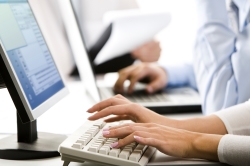 A few years ago I wrote a really detailed blog about dealing with confidential electronic documents and paperwork. This is obviously an important subject for assistants because we have to, have to, have to keep our Executive’s confidence. We must be trustworthy and, as hard as it is, keep all confidential matters to ourselves.
A few years ago I wrote a really detailed blog about dealing with confidential electronic documents and paperwork. This is obviously an important subject for assistants because we have to, have to, have to keep our Executive’s confidence. We must be trustworthy and, as hard as it is, keep all confidential matters to ourselves.
Today I thought I would write an update on my blog from a few years ago and concentrate on electronic documents. With cloud technology, the increased use of email and other electronic forms of communication (Slack, WhatsApp, Facebook Messenger, etc.), we have to be even more aware of how we deal with confidential and information that is discussed and communicated through technological channels. Here are my ten top tips on dealing with confidential electronic documents.
Think about how your desk is positioned. If you are in an open-plan office, is it easy for colleagues to walk up behind you and see what is on your screen? If so, perhaps you should change the position of your screen or move your desk entirely.
A privacy screen is a good call if you handle a lot of confidential electronic documents.
Always, always lock your screen when you leave your desk and when a colleague comes up to talk to you. Set up a timer on your computer so that it automatically locks after a brief period of inactivity.
If you have been asked to email a confidential message to another member of staff – think to yourself: Should I really be emailing this? If the answer is yes, ensure you do everything you can to make them aware the details are sensitive. The following steps should make this clear: a) Mark the email as “confidential” (you can do this in the email options tab). b) Encrypt any attached files. Depending on the sensitivity of the document I will often phone the individual and give the password to them personally. c) Move the emails from your sent file into a secure location.
When a confidential email arrives, avoid opening it in full-screen view. Scan it in a minimised window, and you can quickly click elsewhere to remove it.
Every week or two, have a good sort through your online files (email and shared drive). Make sure you haven’t accidentally left anything visible to the prying eye! Also, it is good practice to delete your temporary files on a regular basis. Anything you open will automatically save there, so if someone does have access to your computer they might be able to open sensitive information.
If you have your work emails on your phone (and who doesn’t?), make sure your phone is pin protected and is timed to 1 minute or less.
Change your computer password on a regular basis and make sure it is difficult to guess. Use a website like LastPass to secure all of your passwords.
You may use WhatsApp or other apps to communicate with your Executive. It is really important that you both decide what exactly you will use this technology for. WhatsApp and the like are great for quick exchanges, but do you really want to WhatsApp details that are private and confidential? Probably not. Although WhatsApp is secure, it just doesn’t strike me as being particularly professional. Make sure you set boundaries with your Executive and your colleagues when using messaging services.
When using collaborative tools such as Trello or Google Docs, again, make sure that only those authorised to see the documents can access them. You can certainly add levels of security and password protection to these sites, so make sure you know exactly how to do that before you work share confidential documents.
Article supplied by Practically Perfect PA http://www.practicallyperfectpa.com.
Launched in October 2011 by Nicky Christmas, writer, international speaker and former Executive Assistant for global organisations in London and Barcelona. Practically Perfect PA is the go-to blog for Personal Assistants, Executive Assistants, Office Managers and Administrative Professionals at all levels of business who are seeking support, information and guidance in their chosen profession. Practically Perfect PA offers practical tips, honest advice and all kinds of career development support specifically for assistants.
Since 2015 Practically Perfect PA has also organised events for the PA profession. Under the banner of Assist Events we hold the annual Future Assistant Conference, which has sold out for the past two years and includes Assist Travel, Assist Regional Events and Assist Training. In 2017, Practically Perfect PA launched the very first virtual summit for PAs, with over 500 attending from around the world. The next virtual summit will take place on Friday 20th April 2018.

